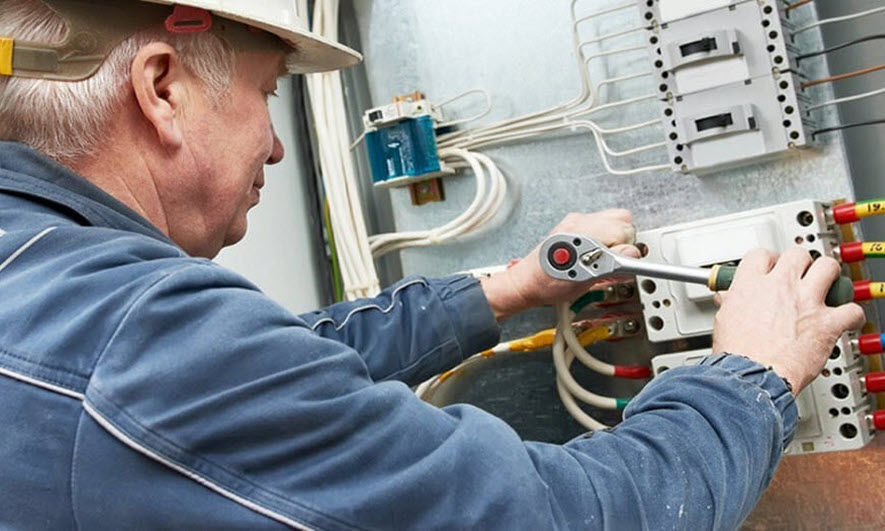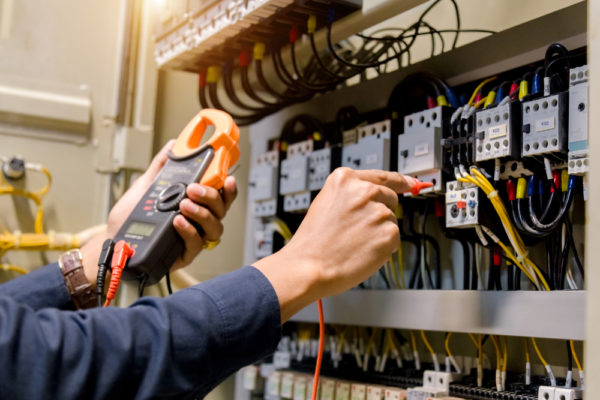Vital High Qualities to Try To Find in Industrial Electrical Contractors for Large-Scale Projects
Wiki Article
The Thorough Function of Industrial Electricians in Ensuring Reliable Power Circulation and Electrical Upkeep in Industrial Settings
The function of commercial electrical experts expands much past standard electrical tasks; they are integral to the stability and efficiency of industrial operations. Comprehending exactly how their experience not just safeguards functional connection yet additionally adds to sustainability initiatives increases important inquiries concerning the future landscape of electric upkeep in industrial settings.Significance of Industrial Electricians
In numerous industrial settings, the role of electrical contractors can not be overemphasized. These specialists are indispensable to the operation and upkeep of electric systems, making sure that power distribution is effective and dependable. Their knowledge not only sustains the day-to-day functioning of manufacturing procedures yet likewise plays an important role in boosting total work environment safety. Industrial electricians have specialized understanding of complex electric systems, including high-voltage equipment and automated equipment, which are necessary for contemporary industrial procedures.In addition, the demand for skilled electrical contractors remains to expand, driven by developments in modern technology and enhanced dependence on automated systems. As industries advance, the need for electrical experts who can mount, troubleshoot, and keep sophisticated electric infrastructure becomes vital. Their payments extend past plain installation; they are vital players in making sure conformity with safety guidelines and sector standards, consequently decreasing risks related to electric failings.
Key Obligations and Obligations
Industrial electricians frequently take part in a selection of crucial duties that are vital to the smooth operation of power distribution systems. One of their main responsibilities consists of mounting, maintaining, and repairing electric wiring and devices in industrial settings. This includes making sure that electric systems follow safety laws and industry standards to avoid risks such as electrical fires or equipment failing.Along with setup jobs, industrial electrical contractors are in charge of fixing and identifying electric problems. They use specialized techniques and devices to recognize mistakes in equipment and power distribution networks, guaranteeing that any malfunctions are promptly resolved to decrease downtime. licensed electrical contractor. Normal upkeep is one more vital aspect of their duty, where they execute preventative procedures and routine inspections to maintain systems working ideally

Abilities and Certifications Required
Effectiveness in electrical systems is crucial for industrial electricians, as it enables them to effectively navigate the intricacies of power distribution (industrial electricians). A solid foundation in electrical concept, including understanding of circuits, voltage, existing, and resistance, is important. Industrial electrical experts must have a comprehensive understanding of electric codes and regulations to make certain conformity with industry requirementsAlong with technical knowledge, sensible skills are paramount. Effectiveness in troubleshooting and problem-solving enables electrical experts to diagnose and fix concerns efficiently, reducing downtime in commercial procedures. Knowledge with various tools and devices, such as multimeters, oscilloscopes, and power analyzers, is likewise essential for effective maintenance and repair work.
Additionally, commercial electrical experts are frequently required to have official education and learning, generally culminating in an associate degree or completion of an apprenticeship program. These programs supply hands-on training and academic expertise, outfitting electrical experts with the skills required for the area.
Certifications, such as those from the National Institute for Certification in Engineering Technologies (NICET), can further enhance an electrician's qualifications, demonstrating knowledge and commitment to the occupation. In general, a combination of education, practical experience, and technological abilities is crucial for success in this requiring function.
Security Criteria and Compliance
Conformity with safety and security requirements is an essential aspect of the industrial electrical expert's duty in power distribution. Industrial electricians are tasked with sticking over here to a wide variety of guidelines and guidelines established by organizations such as the National Electric Code (NEC) and Occupational Security and Health Management (OSHA) These requirements ensure not just the risk-free operation of electric systems however additionally the security of personnel and tools.To achieve conformity, electrical contractors should perform routine inspections and upkeep of electrical systems, recognizing prospective hazards and carrying out corrective actions. This includes correct grounding, circuit security, and the usage of proper individual protective tools (PPE) By preserving a thorough understanding of both nationwide and local codes, electrical contractors can properly reduce threats related to electric work.
Additionally, commercial electricians play a vital role in training workers on safety and security practices and emergency treatments. This education promotes a society of safety and security within the workplace, minimizing the chance of accidents and making sure that all staff members understand their obligations pertaining to electric safety.

Future Trends in Electrical Upkeep
As technology continues to advance, the future of electrical maintenance in power circulation is increasingly defined by the assimilation of wise systems and anticipating analytics. These innovations enable industrial electrical contractors to relocate past conventional responsive upkeep techniques, promoting an aggressive method that improves system integrity and efficiency.One considerable pattern is the adoption of Web of Points (IoT) tools, which facilitate real-time monitoring of electrical systems. This innovation permits the collection of substantial quantities of information, providing insights right into tools efficiency and possible failing factors. By leveraging predictive analytics, electrical contractors Check This Out can expect issues prior to they intensify, lowering downtime and upkeep prices.
In addition, the execution of innovative automation modern technologies is changing electric upkeep. Automated diagnostic tools can rapidly identify faults and recommend rehabilitative activities, simplifying the fixing procedure. This not only improves response times but also decreases human mistake.
Additionally, the growing focus on sustainability is driving the advancement of energy-efficient solutions and renewable resource integration. As commercial sectors significantly embrace greener practices, electrical experts will play a crucial duty in preserving these systems, ensuring that power circulation aligns with ecological standards. Generally, the future of electrical upkeep assures improved integrity, efficiency, and sustainability.
Conclusion
In conclusion, industrial electricians are important to the performance and security of industrial environments. The function of industrial electricians will continue to expand in significance.The role of industrial electricians expands much past fundamental electrical tasks; they are integral to the security and performance of commercial operations (bre automation). Industrial electrical experts have specialized understanding of complex electric systems, consisting of high-voltage devices and automated machinery, which are crucial for modern-day commercial operations
Moreover, commercial electrical contractors work together with engineers and various other this page experts to develop and implement reliable electrical systems tailored to certain industrial demands.Efficiency in electrical systems is crucial for commercial electricians, as it allows them to efficiently browse the intricacies of power distribution.In verdict, industrial electrical experts are important to the functionality and security of industrial atmospheres.
Report this wiki page